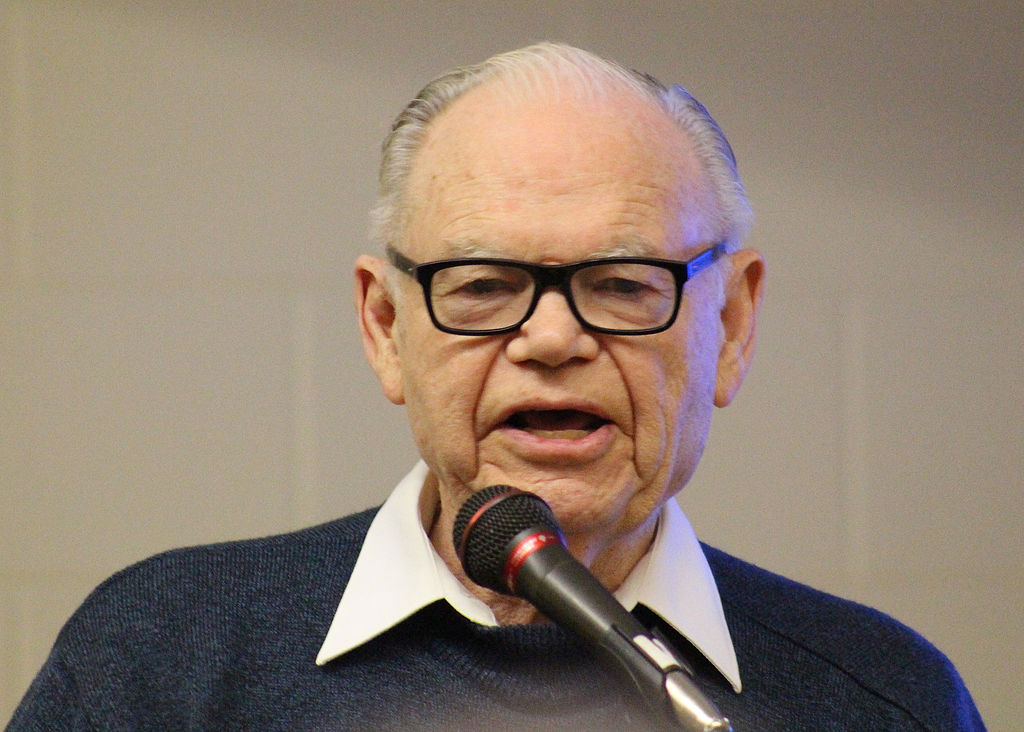Murray Thomson — anti-nuclear peace activist, development educator, founder of numerous organizations, amateur violinist and poetry lover — died in Ottawa on May 2, 2019 at age 96. When Murray turned 90 in December 2012, I attended the party organized by his friends (it doubled as a fundraiser for peace causes). I published the following piece about him then. He was persistent and indefatigable, but never lost his sense of humour. We‘ll miss him.
Happy warrior
If Murray Thomson wasn’t a pacifist, you might call him a happy warrior. The moving force behind many worthy peace endeavours, he will soon turn 90 and more than 130 of his friends gathered recently in Ottawa to celebrate. There was a dinner with much good humour and music, some of it supplied by Thomson on his violin, but predictably the event was also a fundraiser and was preceded by a panel and discussion about the best way to get rid of all nuclear weapons.
An American-based organization called Ploughshares Fund (no relative of Canada’s Project Ploughshares) estimates that there are about 19,000 nuclear weapons in the world. We know that nine countries have them, with Iran threatening to join the club.
A new proposal
Thomson, along with two other elders of the peace movement, has come up with an interesting new proposal. The three are recipients of the Order of Canada (OC), our most distinguished award for public service. Ernie Regehr is a Mennonite and the co-founder (with Thomson) of Project Ploughshares. Doug Roche is a former editor of Catholic newspapers, a Conservative MP between 1972 and 1984, Canada’s UN ambassador for disarmament between 1984 and 1989, and later an independent in the Senate. In 2011, he was nominated for the Nobel Peace Prize.
The three men have created an organization called Canadians for a Nuclear Weapons Convention. They have convinced more than 1,000 other OC recipients to call upon the Canadian government to take a leading role in advocating for international negotiations to achieve a verifiable treaty on the prohibition and elimination of nuclear weapons. Among the OC recipients supporting this call are Margaret Atwood, Roméo Dallaire, Stephen Lewis, David Suzuki and Jean Vanier.
Toasting Thomson
Roche and Regehr were both at the birthday dinner but the talking was left to others, including members of Thomson’s immediate and extended family, friends, and those with whom he had worked.
Randy Weekes was a CUSO field worker along with Thomson in Thailand in the 1960s and 1970s. “He had a great impact on my life,” Weekes said. “He touched and taught all of us.” Weekes referred to the influence that Thomson’s missionary parents and one of his uncles had upon their son. Weekes said the motto was “live so as to be missed” and added that is how Thomson has spent his life.
Andy Thomson, a nephew, said the Thomson family spent seven years in China as United Church missionaries and that Murray was one of seven siblings. “Uncle Murray has an extraordinary commitment to peace and nuclear disarmament. He never gives up.” He said that in addition to the great respect in which Thomson is held, he is also an attentive parent, grandparent and a favourite uncle in the extended family.
Thomson’s daughter Sheila Quarles said that her father’s stubborn resolve to “making a difference” is the key to his longevity. “He is inspired, disciplined, and fun loving. He does his stretches every morning. He laughs and tells silly jokes. He sings, he makes music, he meditates, and he plays games. He also has another motto, which is to always foster friendships.”
Resisting militarism
Thomson has a deeper appreciation than most about militarism. He was a student at the University of Toronto when the Second World War began. He enlisted in the air force and became a pilot although he never actually flew a combat mission. He was still in the military when, in 1945, the U.S. dropped two atomic bombs on Japan. He has often said that Hiroshima and Nagasaki made him a pacifist and he has spent the years since then resisting militarism and working for peace.
He is a Quaker and has worked for Quaker-based organizations in addition to working for CUSO and co-founding Project Ploughshares. He is also a founder of Peace Brigades International and of Peace Fund Canada, a campaign aimed at allowing conscientious objectors to have their tax payments spent only for non-military purposes. He has received the Order of Canada, the Pearson Peace Medal and other awards.
When it came his time to speak to his birthday audience, Thomson said that he has “pondered the folly of nuclear weapons” ever since his undergraduate days at the University of Toronto more than 60 years ago. He cited Robert McNamara, a former U.S. defence secretary, as saying that Americans and Soviets were lucky to avoid nuclear war in the 1960s. “It could happen at any time.” Thomson said. “We must abolish nuclear weapons.”
Big ideas
He also spoke of the importance of what he called “big ideas” in the effort to achieve disarmament. “If the NGOs want a world without war, then we have to work hard to organize it,” he said.
This piece appeared on Dennis Gruendng’s Pulpit and Politics blog on May 4, 2019.
Image: Wikimedia Commons
Help make rabble sustainable. Please consider supporting our work with a monthly donation. Support rabble.ca today for as little as $1 per month!





